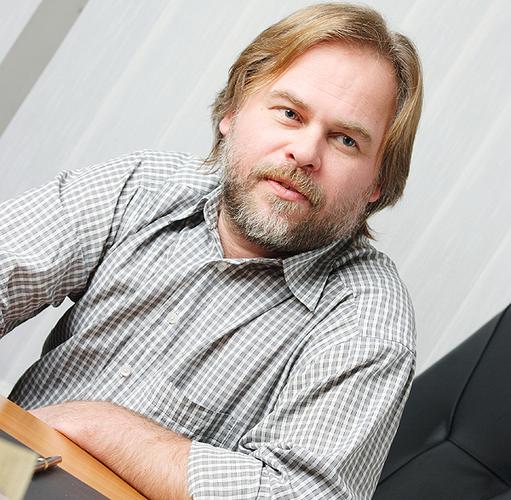Name
Evgeniy Valentinovich Kasperskiy (Eugene Kaspersky)Organisation
Kaspersky LabsTitle
Head of research and technology, and co-founder with CEO Natalia Kasperskaya.Born
1965 in Novorossiysk, a Soviet 'hero city' and Black Sea port.Vice
Single malt scotch whiskey, aged.Philosophy
Be open, honest and workable. Experiment, and consider all members of the team equal.Career
Graduated from the Institute of Cryptography, Telecommunications and Computer Science in Moscow, is a former senior lieutenant in the Ministry of Defence where he worked on government IT projects . The course was gruelling: only five students from more than 100 made the cut while the rest he says either became software engineers or “went crazy”.Kasperskiy fell into the business after his defence computer was infected with the Cascade virus virus in 1989, which lead him to become an entomologist of sorts; he collected, sorted and classified worms and viruses “like hobbyists might collect butterflies” and developed the first remedies in 1991.
He soon noticed viruses were proliferating and banded together with colleagues in the Kami Information Technology centre where he began the arduous task of writing anti-virus on a larger scale. After a series of successes and failures, Kaspersky Labs was established in 1997 by Eugene's ex-wife Natalia, jettisoning the former product title AntiViral Toolkit Pro following a legal dispute.
Kasperskiy on Slammer
On January 25 2003 the Slammer worm was unleashed on the Internet. True to its name, the tiny worm infected about 70,000 devices in 10 minutes, proliferating through and infecting vulnerable routers, which cause systematic and repeating failures as machines tried to recover. “Slammer shocked me,” Kasperskiy says. “It de-fragmented the American backbone and cut off South Korea.”Only a week earlier, Kasperskiy held a press conference with Russian media to warn of the prospect of a mass exploit of a hole in Microsoft SQL Serve Resolution Service, but he said few took notice. He discussed the idea of a “global epidemic” and “the First Worm” with other experts and university researchers two years prior to the attack, but kept silent to avoid “opening Pandora's Box”. That he admits he knew the attack was inevitable, did not prepare him: “it was unbelievable... the traffic went up by more than 25 percent was so huge and we still don't know where it came from.”
Cybercriminals still net nerds
There is no evidence to suggest a link between traditional organised crime and cyber-criminals, Kasperskiy says. Forget the latest Die-Hard; the quintessential criminal boss is still a techno-luddite and oblivious to the machinations of phishing and data-ransom. “Traditional criminals deal in guns prostitutes, drugs and street fraud — they don't have the education or knowledge. The cyber-criminals are software engineers and they won't fight people on the street or rob a bank,” he says, acknowledging that good guys and criminals both require skilled developers: “we swim in the same sea, but hunt for different fish.”Hackers are guerilla fighters and generally have the advantage in online security, but resources are important. In Russia, the bad guys are winning. They have a bigger, better pool of "elite" software engineers to recruit, as does Kasperskiy. Elsewhere, he says the tide of war constantly shifts: "anti-virus is both reactive and proactive. Sometimes we follow them, other times we develop very good security that they can't break. We laugh when we see [malware writers] talking frustated to each other on message boards that they cannot break something we developed."
Kasperskyi says he will "never leave the motherland" despite the company's push into Symantec and Trend Micro-dominated markets outside Europe. "Russia has great software engineers - we employ more than 300 [there], and to do the same in other countries like Austrailia would be very hard on national economics," he says, referring to Australia's smaller pool of skilled workers. Russian software engineers are returning home lured by better wages which are now on par with Silicion Valley, following a mass emigration to the US in the early 1990s.
Processing protection
Sluggish anti-virus programs have long been the bane of resource-strapped computers, and many users are prepared to run only a firewall to conserve resources; after-all, risk can be mitigated by not storing personal information locally and avoiding phishing e-mails and nefarious Web sites. Not so, says Kasperskiy: "you don't need [anti-virus] if your computer is disconnected from the Internet, turned off and the user is dead." Casting aside the risk of infecting other nodes on the LAN, Kasperskyi says botnets increase the bandwidth consumption on ISPs that pass on higher prices or badwidth limitations to customers. Then there's the altruistic responsibility of securing your computer to keep it off the spam networks.Vendors have come a long way to reduce the processing demands of anti-virus and the bundled security packages. Norton Anti-Virus, once arguably the worst resource-hog of the lot, now offers a slim "gaming edition", while Kaspersky Labs is targeting pre-installs in laptops as it claims its low-resource anti-virus preserves battery life.



